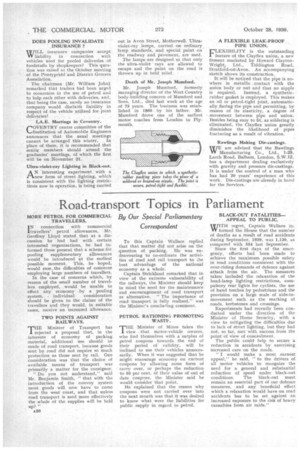Road-transport Topics in Parliament
Page 22

If you've noticed an error in this article please click here to report it so we can fix it.
By Our Special Parliamentary Correspondent
MORE PETROL FOR COMMERCIAL TRAVELLERS.
I N connection with commercial travellers' petrol allowances, Mr. Geoffrey Lloyd stated that at a discussion he had had with certain interested organizations, he had informed those present that a scheme for pooling supplementary allowances would be introduced at the earliest possible moment. This, he hoped, would ease, the difficulties of concerns employing large numbers of travellers. In the case of concerns which, by reason of the small number of travellers employed, would be unable to effect any economy by a pooling system, individual consideration should be given to the claims of the travellers and they would, in suitable cases, receive an increased allowance.
TWO POINTS AGAINST RAILWAYS.
THE Minister of Transport has rejected a proposal that, in the interests of economy of packing material, additional use should oe made of road transport, because goods sent by road did not require so much protection as those sent by rail. One consideration was that the choice of available means of transport was primarily a matter for the consignor.
"Do you not understand," said Mr. Benjamin Smith, "that with the introduction of the convoy system most goods will now have to come from the west coast, and that unless road transport is used more effectively the whole of the supplies will be held up?"
A20 To this Captain Wallace replied that that matter did not arise on the question of packing. He was endeavouring to co-ordinate the activities of road and rail transport to he best advantage of the national economy as a whole.
Captain Strickland remarked that in view of the extreme vulnerability of the railways, the Minister should keep in mind the need for the maintenance and encouragement of road transport as alternative. " The importance of road transport is fully realized," was the Minister's concluding comment.
PETROL RATIONING PROMOTING WASTE.
THE Minister of Mines takes the view that motor-vehicle owners, who find themselves with a:surplus of petrol coupons towards the end of their period of validity, will be inclined to use their vehicles unnecessarily. When it was suggested that he might encourage economy on current coupons by allowing some form of carry over, or perhaps the reduction to 50 per cent. of their value of out of date coupons, the Minister said he would consider 'that point.
He explained that the reason why coupons were not carried over into the next month was that it was desired to know what were the liabilities for public supply in regard to petrol.
BLACK-OUT FATALITIES— APPEAL TO PUBLIC.
WITH regret, Captain Wallace in. W formed the House that the number of deaths as a result of road accidents during September, 1939, was 1,130, as compared with 554 last September.
Since the first days of the emergency, efforts had been made to achieve the maximum possible safety in road conditions consistent with the over-riding demands of defence against attack from the air. The measures taken included the relaxation of the head-lamp lighting restrictions, coinpulsory rear lights for cyclists, the use of hand torches by pedestrians and the provision on a large scale of aids-tomovement such as the marking of roads, kerbstones and crossings.
Experiments had recently been conducted under the direction of the Minister of Home Security, with a view to mitigating the difficulties due to lack of street lighting, but they had not, so far, met with success from the point of view of concealment.
The public couldhelp to secure a reduction in accidents by exercising increased care on the roads.
"I would make a most .earnest appeal," he said, " to the driers of all motor vehicles to recognize the need for a general and substantial reduction of speed under black-out conditions. The black-out must remain an essential part of our defence measures, and any beneficial effect which a relaxation would have on road accidents has to be set against an , increased exposure to the risk of heavy casualties from air raids."






























































